Feral Cats

All of our centres are urgently in need of new homes for pairs and families of feral and semi-feral cats.
Our feral cats are ideal for outdoor homes such as stables, smallholdings, farms, large gardens etc. They require daily feeding and dry shelter but earn their keep as an effective rodent patrol.
Our rescue teams usually neuter and return feral cats to continue living where they are, provided they are being fed and have someone to keep an eye on them. Sometimes though cats cannot be returned to site due to redevelopment, demolition, an unsafe environment, no one to feed them, hostile people etc, and for these we seek suitable new homes.
We can rehome to Essex, Surrey, Kent, East Sussex, West Sussex, and London boundaries. We initially deliver cats in a holding pen to settle them, and provide life-long assistance should it be required - e.g. health care, moving etc.
For more information about Feral and semi-feral cats and kittens please read on...
THE CELIA HAMMOND ANIMAL TRUST has always given priority to, and spent much time and effort helping feral cats and feral kittens both in London and the South East. For those who are not familiar with the term 'feral' - and many misconceptions abound - please read on.

When an unneutered female pet cat gets lost or is abandoned, unneutered male cats will mate her. She will give birth to the kittens wherever she can. This may be under or in a garden shed, in a derelict car, in thick bushes, in an empty building, in an abandoned settee or anywhere she feels she may be safe.

Unless the kittens are discovered when they are very young, generally the first anyone will be aware of them will be when they are brought out by their mother to look for solid food at around six weeks old.
At this age the kittens will already be nervous of human contact because they have not been handled and socialized. This nervousness is sometimes termed 'wild', and this is the result of lack of handling. If the cat and her kittens are rescued, the kittens can be tamed. The younger the kittens are the easier this is. Taming feral kittens takes time, patience and gentle handling but is ultimately very rewarding.
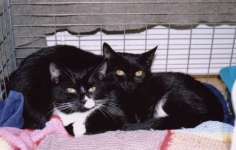
CHAT rehomes hundreds of feral kittens each year and has a very high success rate with taming feral kittens thanks to a combination of the gentle and patient efforts of CHAT staff, volunteers and patient new owners. If the kittens are not rescued, they will themselves be capable of breeding from four months old, and a colony of feral cats rapidly grows.
It is important to realise that feral cats and domestic cats are the same species of animal. It is the lack of human contact in the critical first few weeks that results in the kittens becoming feral. If a pet cat has kittens, and her owners do not handle those kittens, her kittens will be equally nervous and may be described as ‘feral’.
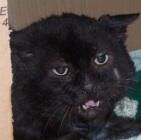
Many stray cats are not feral cats, they were once someone’s pet but become nervous because of their experiences living as a stray.
Unneutered male cats are particularly likely to become stray as they wander looking for females. Their fighting with owned cats and the offensive smell of their urine spraying to mark their territory makes them unpopular with people who shoo them away.
Once rescued and neutered it may only be a matter of days or it sometimes takes several weeks for those cats to regain their trust in people and restore them to loving pets.
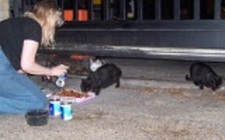
Celia Hammond has been rescuing feral cats in London and the South East for over 30 years, choosing to focus on them because of the terrible situations she found them in and the hardship they had to endure. Whilst animal charities were attending to pet animals, feral cats were largely ignored and controlling their population was left to pest control firms.
Celia learnt how to humanely trap feral cats and get them neutered, thus preventing colonies from growing any larger.
 Cats returned to colonies have the top of their left ear clipped. This is known as 'ear-tipping' and does not cause the cat any distress. This is done so that they can be easily identified by anyone as neutered. Ear-tipping is a standard practice used by all animal rescue organisations working with feral cats.
Cats returned to colonies have the top of their left ear clipped. This is known as 'ear-tipping' and does not cause the cat any distress. This is done so that they can be easily identified by anyone as neutered. Ear-tipping is a standard practice used by all animal rescue organisations working with feral cats.
Initially Celia had no option but to return all cats to sites after neutering, as at the time she was the only one doing this type of work and there just weren’t sufficient outlets for feral cats. Euthanasia of healthy cats was not an option for her.
 Today, CHAT has the option of rehoming neutered adult feral cats to outdoor homes such as farms, stables, smallholdings and even gardens. Families of cats in danger on the street, demolition sites, living under cars or with no reliable food source are taken into our care and rehomed to suitable new homes. CHAT rehomes adult feral cats throughout most of South East England including Kent , East Sussex, parts of West Sussex, Surrey and Essex as well as suitable homes within London.
Today, CHAT has the option of rehoming neutered adult feral cats to outdoor homes such as farms, stables, smallholdings and even gardens. Families of cats in danger on the street, demolition sites, living under cars or with no reliable food source are taken into our care and rehomed to suitable new homes. CHAT rehomes adult feral cats throughout most of South East England including Kent , East Sussex, parts of West Sussex, Surrey and Essex as well as suitable homes within London.
Once these cats have been delivered to their new homes, the cats are confined to a holding pen containing beds, litter trays and food and water for 3 weeks. It is essential to confine the cats initially or they would just run away. This is the same principle as keeping a pet in when moving house. Once released, the cats return for their daily feeds. We do insist that the cats are fed the same quality and quantity of cat food as a pet cat. An added attraction is that feral cats earn their keep as farm cats or yard cats by controlling rodents at farms and stables.
Although in some areas in which CHAT works with cats there are not as many feral cats now as when Celia first began helping them, there is still a large problem. You may not be aware of this because of the cats' nervous nature, which leads them to be largely active at night. CHAT helps feral cats in London and also on farms etc in rural areas.
There are estimated to be 2 million strays on UK streets and the true figure may be much higher.
CHAT is pleased that recently, some other animal charities have also begun neutering feral cats and are realising that feral cats can be relocated if necessary. However, many feral cats are still euthanased by organisations who do not wish to try and help them or are destroyed by pest control firms.

Whether cats are taken away for rehoming, or neutered and returned to site it is important that action is taken quickly. Cats breed rapidly. A cat and a litter of kittens can easily grow to a colony of fifteen to twenty within a year and forty the next.
We are frequently dismayed to hear some of the cruel and ill-informed advice being given to people seeking help with feral cat situations. They are often told, 'Don't feed them and they'll go away'. They may well move along the road until they find someone who will feed them, but what if they are repeatedly turned away, what then? The domestic cat whether tame of feral has learnt to be reliant on humans either deliberately feeding them or being able to scavenge their leftovers. Withholding food could easily result in extreme suffering and also the deaths of kittens belonging to malnourished mothers.

Rehoming feral cats is an important part of CHAT's work, but there is a limit to the numbers of new homes for them. Farms often have breeding colonies of farm cats. CHAT rescue workers regularly visit farms to neuter farm cats. The majority of our work with feral cats involves neutering colonies and returning them to their existing site so long as they have shelter, a food supply and the site is expected to be permanent i.e. not to be redeveloped.
One of our tasks is to try to educate people that the cats are not to be viewed as a nuisance and once neutered, they will not fight with neighbourhood cats, they will cease spraying to mark their territory and their numbers will no longer increase. Most attractively, they will catch mice and rats.
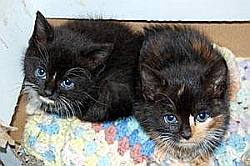
Feral Kittens
Kittens born hidden under sheds, in derelict buildings, cellars, old cars, amongst rubbish in bushes and so on, do not receive the handling and TLC that a litter born in a home usually do. Missing out on this early contact with humans leaves them wary of people and this nervous disposition is termed 'feral'. Kittens born in a home can also become feral if they are not handled, this often occurs in multi-cat household rescues that we have attended.
Each year, CHAT rescues hundreds of feral kittens from urban environments in London and rural situations in Kent and Sussex.
Feral kittens can be tamed, and 95% of those we rescue are rehomed to domestic homes.
So how does an initially hissing, spitting, terrified bundle of fur end up as a contented fireside pet?
The short answer is they receive lots of gentle patient coaxing and attention, hand feeding, playing and gentle handling to get them used to human contact. Some kittens are 'tame' within days, others take two or three weeks or longer, generally the younger they are the easier taming is, older kittens of four months or more can take many weeks to 'tame'. There are certainly differences between kittens as to the ease with which their confidence can be gained, even within the same litter when all the kittens receive the same amount of attention some progress faster than others.
In order to aid taming feral kittens they do need to be accommodated in a relatively restricted space so that they can be handled without having to effectively chase them about to make physical contact.
A kitten pen is ideal, this is basically a mesh pen with front open doors and is large enough to contain a cardboard box bed (with the front cut down), a litter tray and food and water bowl.
Feral kittens are kept in a minimum of pairs (usually siblings) as one kitten on it's own would be really frightened, however keeping whole litters or larger groups of kittens together generally delays taming.
Within a home environment the kitten pen can be set up in a room where people spend a lot of time, this allows the kittens to get used to the household and sounds such as people chatting, television, radio, and also to safely meet other pets through the cage mesh. This should be within a room with a door that closes securely for when the kittens are later allowed out into the space of that room. There also must not be an open chimney, holes in floorboards or skirting boards and it should not be a room that contains the front or back door for obvious reasons of avoiding accidental escape.
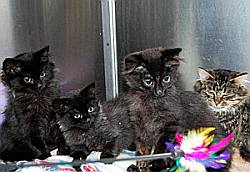 When approaching the kittens we talk in a gentle low voice, taking care not to tower above them but to kneel down at their level. When wanting to stroke the kittens we gently stroke under their chins so that they can see what we are doing and feel that they are in control, rather than approach from above their heads which would make them feel threatened.
When approaching the kittens we talk in a gentle low voice, taking care not to tower above them but to kneel down at their level. When wanting to stroke the kittens we gently stroke under their chins so that they can see what we are doing and feel that they are in control, rather than approach from above their heads which would make them feel threatened.
Whilst in the pen the kittens can be hand fed tasty tit bits, this helps them to associate humans with nice food. We also play with them using toys such as feather sticks, which are also very useful for stroking initially terrified kittens with thus avoiding risking ourselves being bitten! Kittens soon cannot resist patting toys, once they are enjoying playing games or eating tasty morsels that we offer they are well on the way to accepting us – they can't be frightened and having fun at the same time. Taming kittens is always a case of two steps forward and one step back.
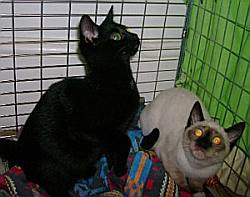
On initially approaching the cage during the first few days, we are generally greeted by hissing and spitting yet by the end of a half hour play session, the kittens wide frightened eyes have softened and they are more relaxed.
Return an hour later, and again we are greeted by a hiss. Gradually each day an improvement is seen. As soon as we are able to stroke the kittens with our hands, rather than just with a tickle stick, we continue spending plenty of time doing so - several times a day.
The first purr is just the most rewarding sound, then we know they have accepted us and will be fine.
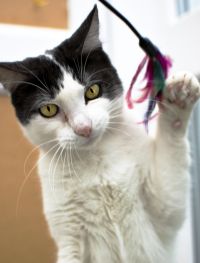
When the kittens are more relaxed and showing signs of being a bit bored in their pen rather than frightened and hiding in their bed, then it is time to let them out of the pen into one room. It is likely to take at least a week to reach this stage, possibly 10 -14 days.
Once the pen door is opened the kittens are allowed to come and go freely in and out of the kitten pen, a second litter tray placed in the room is a good idea.
Enjoying the luxurious space of a whole room, they may become more shy again for a few days. It is now important not to try and pursue them to handle them but instead to lie on the floor at their level offering food from our hands and playing games with tickle sticks, toy mice and toys on string.
Their confidence with us soon returns and after a couple of weeks the kittens are allowed access to the whole of their home where they will soon be discovered sleeping on their owners bed in the morning and getting up to the usual kitten antics.
Feral kittens usually end up as friendly as any domestic cat with their owners but often remain shy of strangers, disappearing out of sight when the doorbell goes only to miraculously reappear the moment they leave.
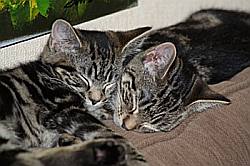
For most people taming feral kittens is a deeply rewarding experience, but lots of patience is needed and some people are frustrated or disheartened if progress is slower than expected. Feral kittens do require calm and patience in order to settle, and therefore are not suited to homes with young children or very busy households.
Homes needed for our feral and semi-feral cats!
 All of our centres are urgently in need of new homes for pairs and families of feral and semi-feral cats.
All of our centres are urgently in need of new homes for pairs and families of feral and semi-feral cats.
Our feral cats are ideal for outdoor homes such as stables, smallholdings, farms, large gardens etc. They require daily feeding and dry shelter but earn their keep as an effective rodent patrol.
Our rescue teams usually neuter and return feral cats to continue living where they are, provided they are being fed and have someone to keep an eye on them. Sometimes though cats cannot be returned to site due to redevelopment, demolition, an unsafe environment, no one to feed them, hostile people etc, and for these we seek suitable new homes.
We can rehome to Essex, Surrey, Kent, East Sussex, West Sussex, and London boundaries. We initially deliver cats in a holding pen to settle them, and provide life-long assistance should it be required - e.g. health care, moving etc.
If you are interested in adopting feral/semi-feral cats from us, please contact our homing teams:
Lewisham: 07768 122844 / 0208 694 6545 or email lewisham@celiahammond.org
Canning Town: 020 7474 8811 or email canningtown@celiahammond.org
Hastings: 01424 882198 or email sanctuary@celiahammond.org
Wadhurst: 01892 783367 or email wadhurst@celiahammond.org
Thank you.
